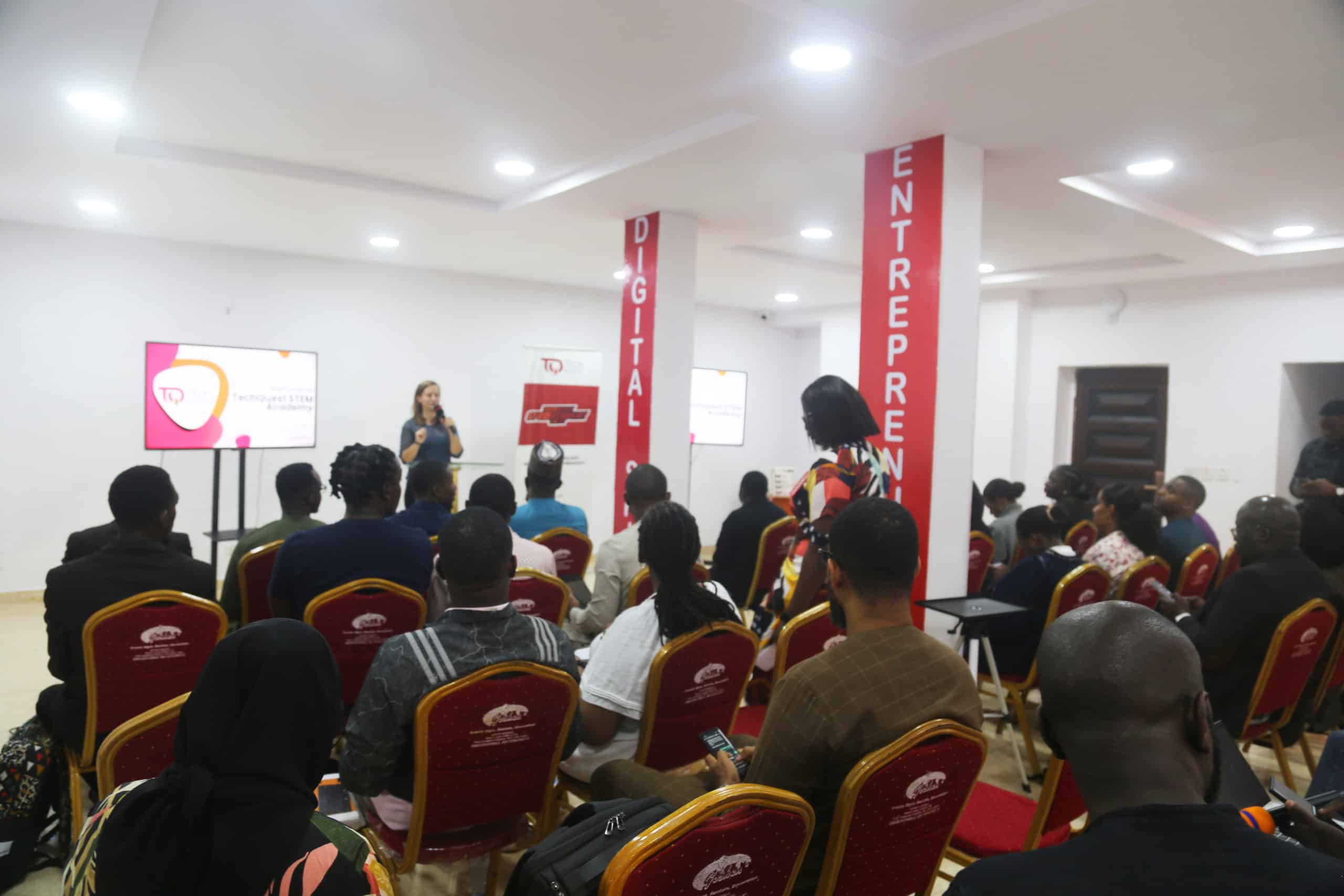On a recent working tour of the TechQuest Hub in Lagos, Nigeria, recently, Digital and Innovation Fellows from the African Union (AU) engaged with Charles Emembolu, the Founder and Director of TechQuest STEM Academy who spoke about how innovators organized as one body for the Innovation Support Network (ISN).
Emembolu, speaking in his capacity as the director of ISN, explains: “We have shifted our focus from merely complaining about lack of government support to proactively engaging with them. This shift has led to increased interactions with both federal and state governments.
“Currently, our office is located alongside the National Information Technology Development Agency (NITDA). As a result, we actively participate in any engagement or activities organized by NITDA,” he says.
According to the organizers, the fellowship program, which started accepting applications in 2021, aims to identify and deploy skilled tech innovators within the African continent to various AU headquarters and departments as ‘resident fellows’. Their role is to understand the system within those departments, identify challenges, and propose solutions.
They note the goal is to tackle African challenges by fostering co-creation and building innovative tailor-made products and services by startups and small and medium-sized enterprises (SMEs) across the continent.
Loading...
According to a recent global startup ecosystem report by Startup Genome, Lagos became the regional leader in ecosystem values and early-stage funding in 2022.
It is home to over 400 startups, representing about 88% of the total number of startups in the country. Lagos led these regions with a total ecosystem value of $8.43 billion, while Nairobi, Johannesburg, Dakar, and Accra received $7 billion, $3 billion, $2 billion, and $1 billion, respectively.
Obi Asika, convener of The Omniverse, a technology and innovation ecosystem platform, emphasizes the need for collaboration across the board to deliver and scale.
Asika, a member of the ISN, highlights: “Digital sovereignty is a significant concern that Africa must address. Omniverse believes that technology can provide the wings needed for everyone to soar. These innovations emerge from the ecosystem, and we anticipate witnessing further developments.”
The Lagos ecosystem visit allowed for interaction with founders and the AU and AfriLabs contingent, and was an opportunity for key stakeholders with aligned interests to engage. It also offered showcasing opportunities for founders.
Founders from across Nigeria who showcased their innovations included Aminu Ibrahim Hashim (Kamel), Christiana Okere (MyStash), Hafsat Sahabi Dange (EasyComply), Dirug Samuel (NorthWave), Joseph Orjinta (EvriSale), Soji Akinlabi (Centre for Digitization of Indigenous African Languages—CDIAL), Osasumwen Asoro (Asoro Automotives), Siro Collins (Advanced Engineering Centre), Ahmed Idris (Adashi), and Michael Osumune (Moon Innovations).
Osumune, Founder of Moon Innovations, shared his experience at the Lagos ecosystem visit and expressed the need for more support from the local community to thrive in the Nigerian startup ecosystem.
He tells FORBES AFRICA: “It’s been an exciting experience showcasing at the Lagos ecosystem visit, connecting with people and sharing our mission to accelerate digital transformation in Nigeria using solar technology.
“The Nigerian startup ecosystem shows promise with its abundance of bright young minds. However, to thrive, we require more support from the local community, just like the support offered by Lagos ecosystem.”
Similarly, Orjinta, Founder of Blualpha’s EvriSale, pointed out the need for increased funding to assist tech startups in the sales and marketing of their solutions.
“More funding should be provided for most tech startups to support them in sales and marketing of their ready-to-market solutions to their target audience,” he says.
He also laments the fact that “Nigerians are not quick to adopt technologies that they can benefit from”.
Implemented through the German Federal Ministry for Economic Cooperation and Development (BMZ) Commission’s Deutsche Gesellschaft fuer Internationale Zusammenarbeit (GIZ) DataCipation program, the fellowship has already produced 13 fellows. It also supports the AU and its branches in enhancing citizens’ engagement.
In appreciation of the GIZ, the Digital Transformation Center (DTC) Nigeria, and TechQuest STEM Academy, Orjinta considers the meet-up an opportunity to gather tremendous insights from the fellows. He also believes the insights demonstrate the potential for his app to scale and be utilized in AU member countries.
Loading...
